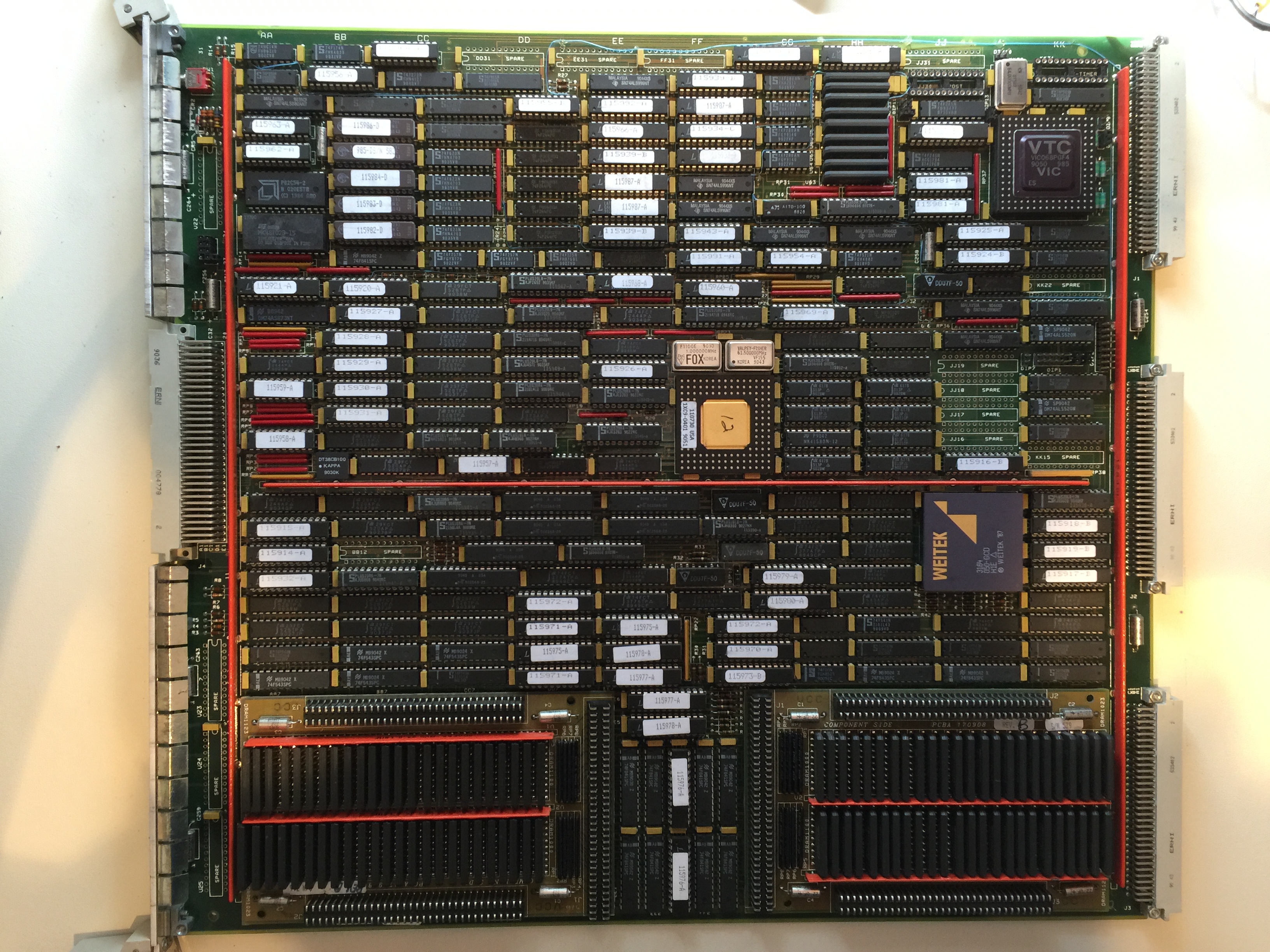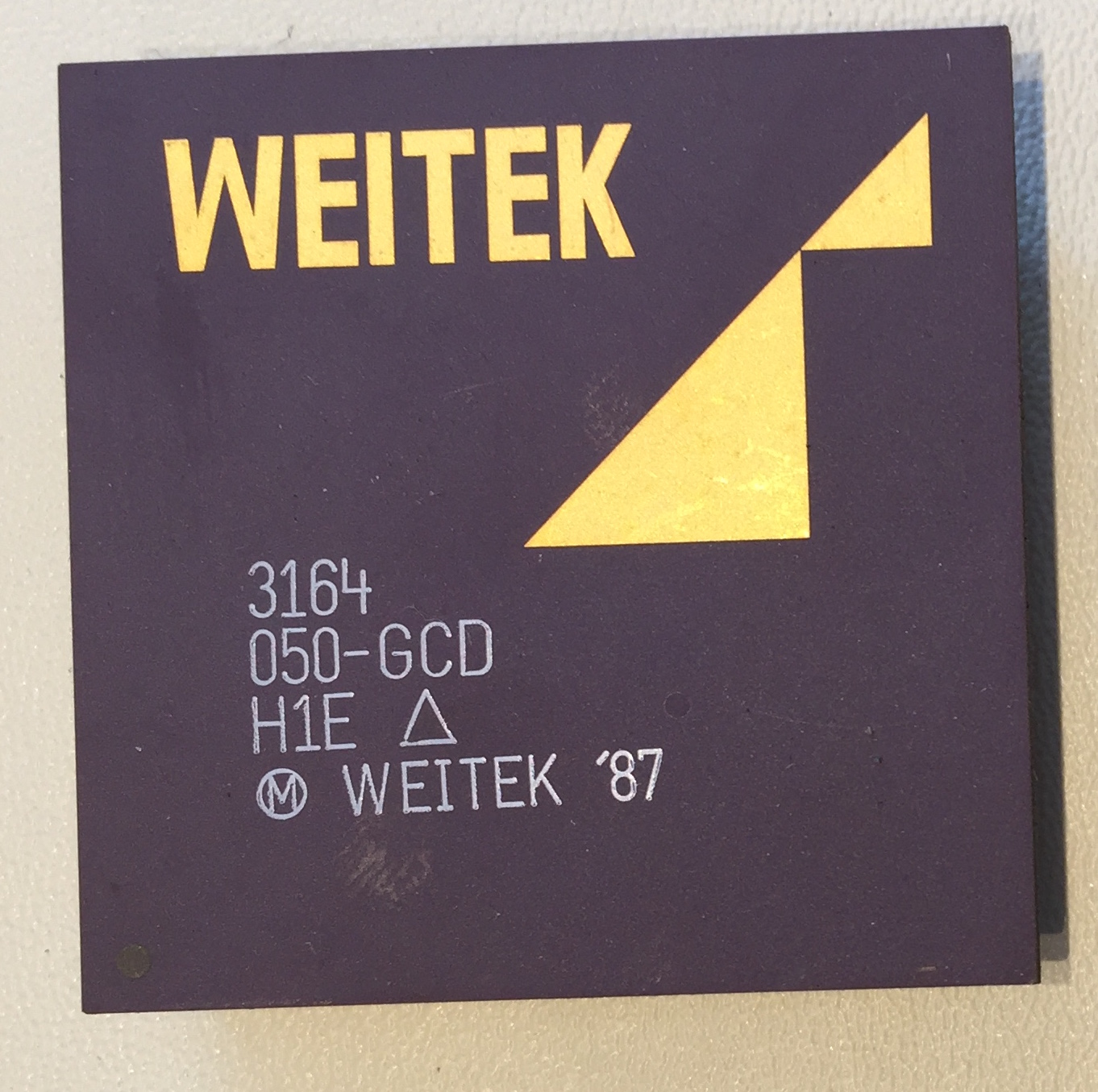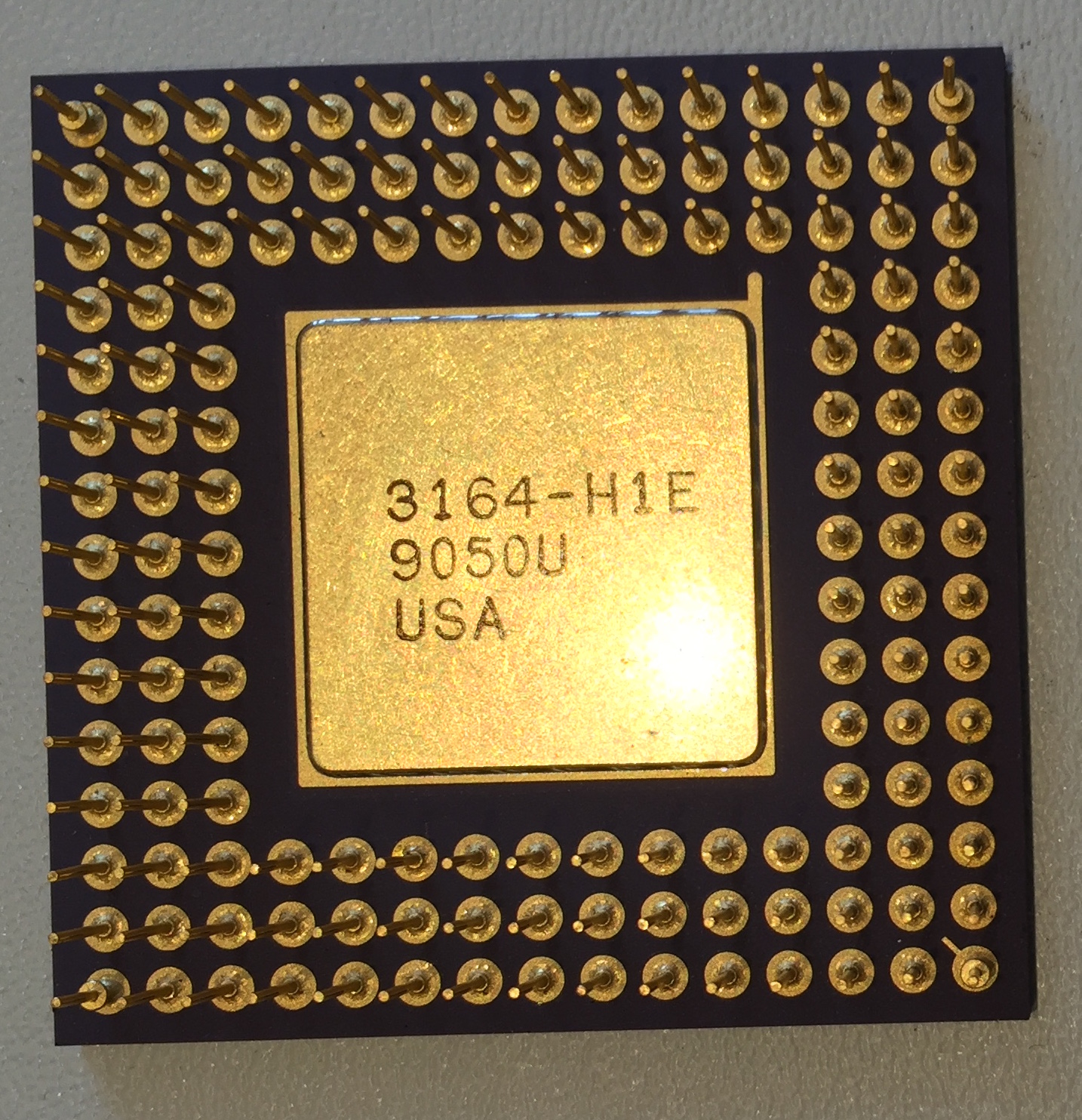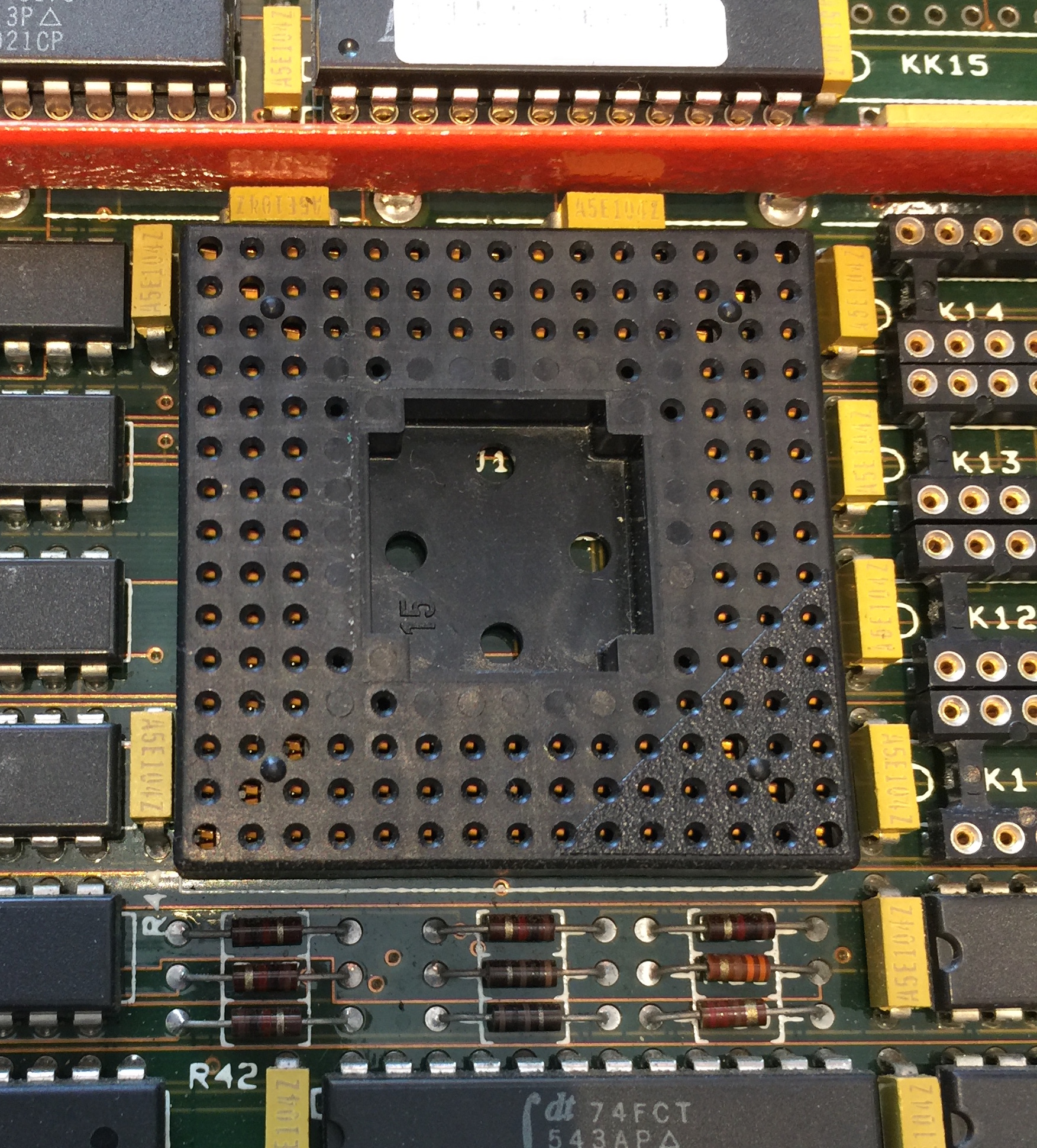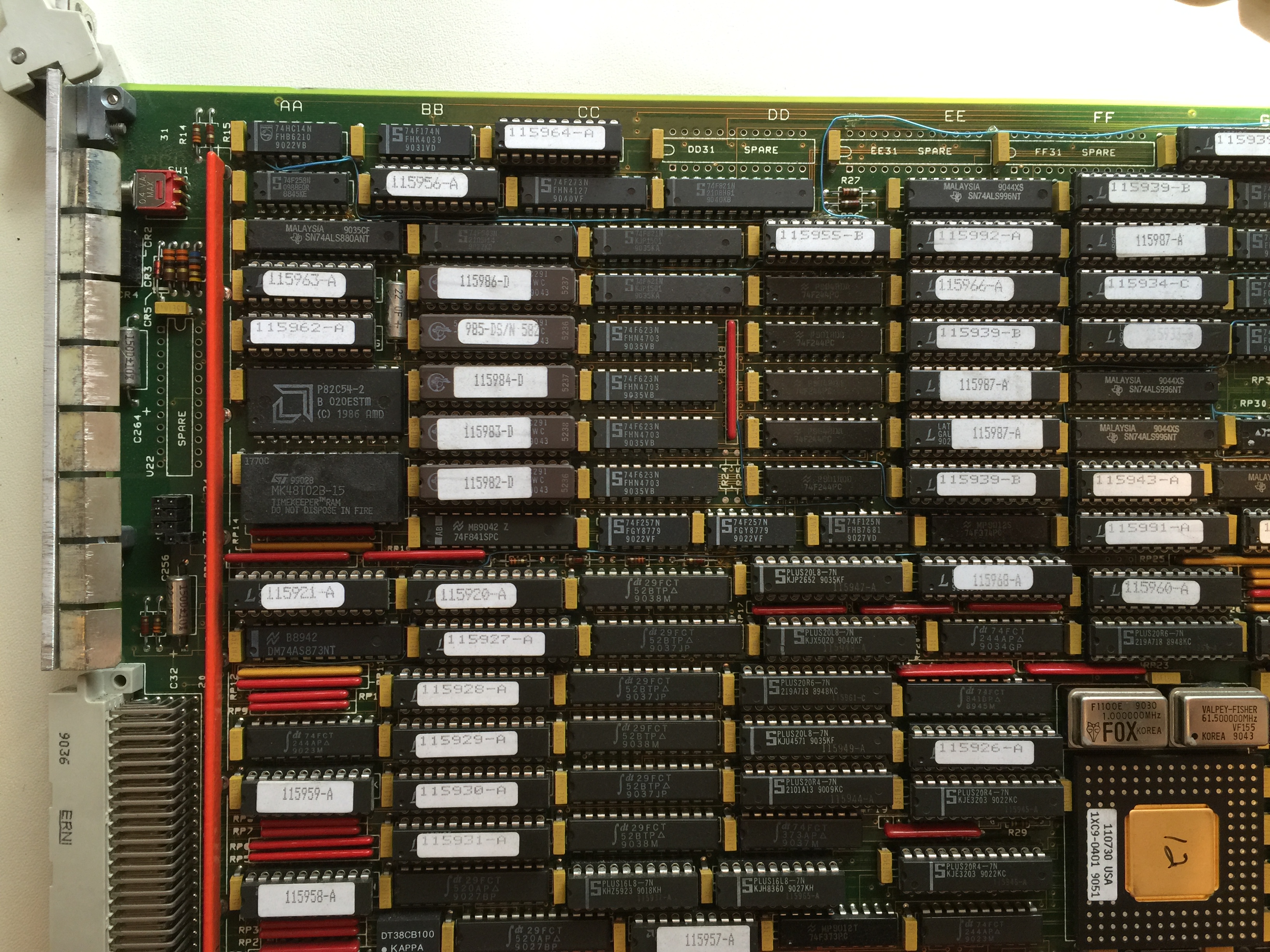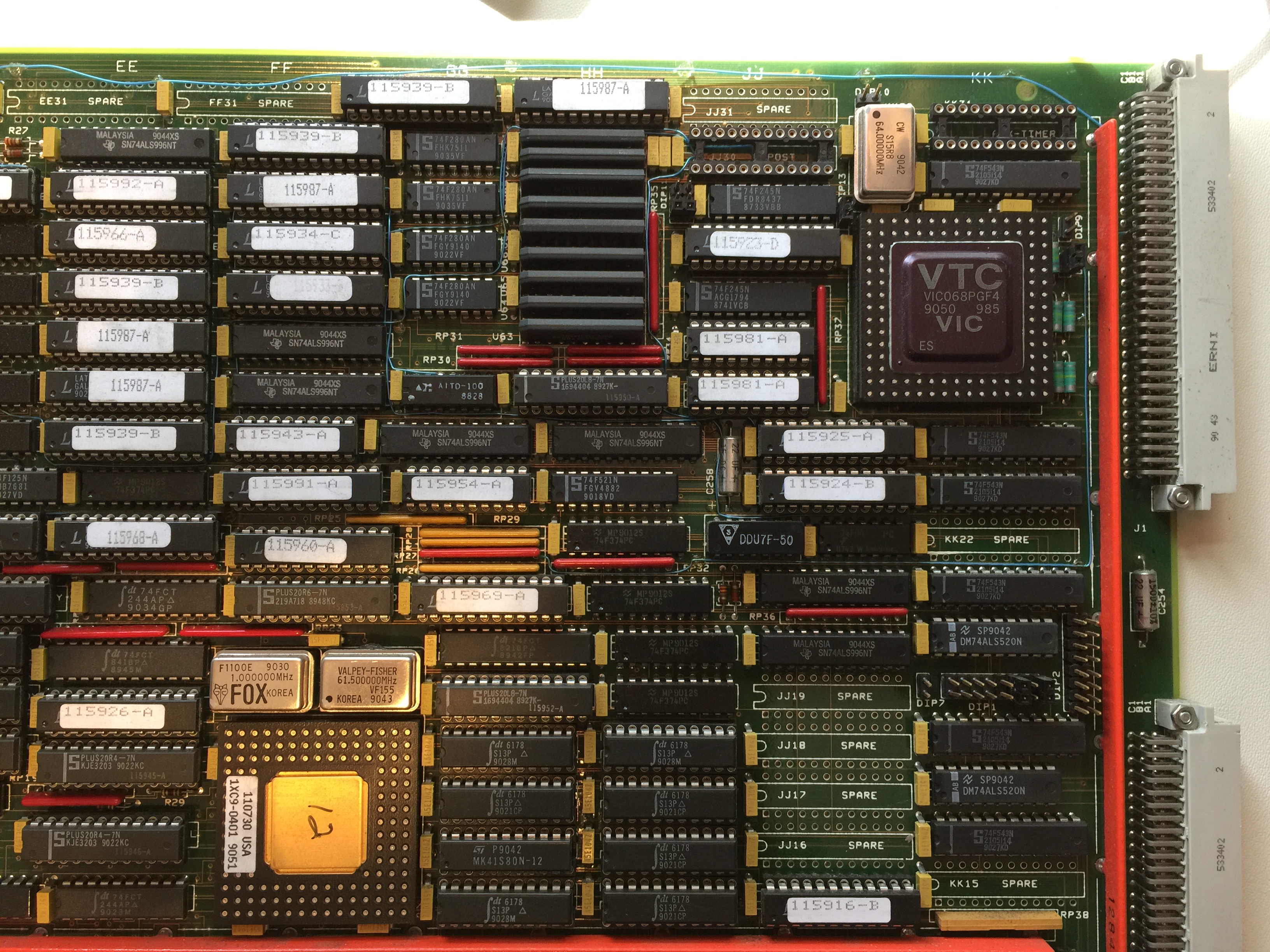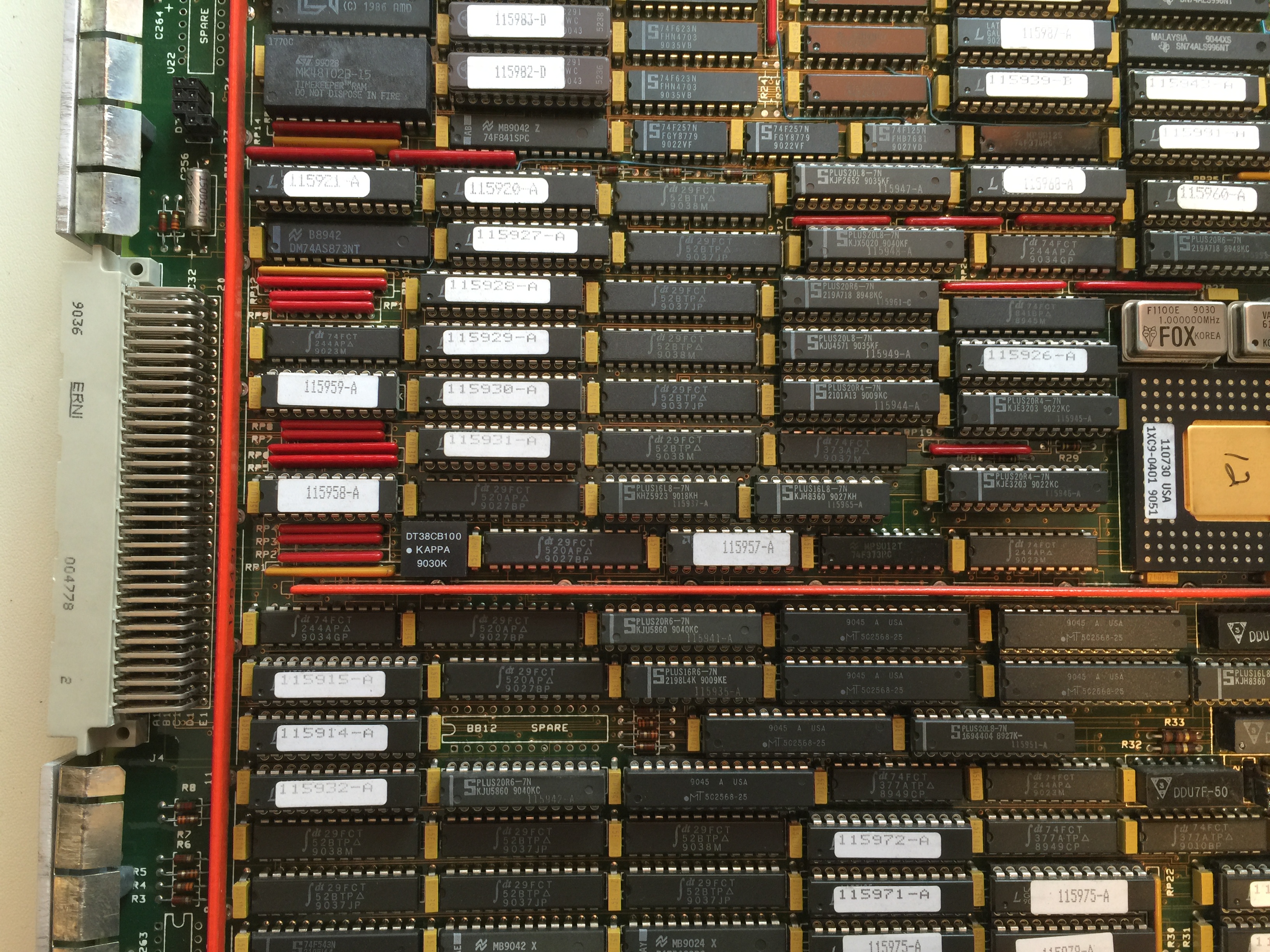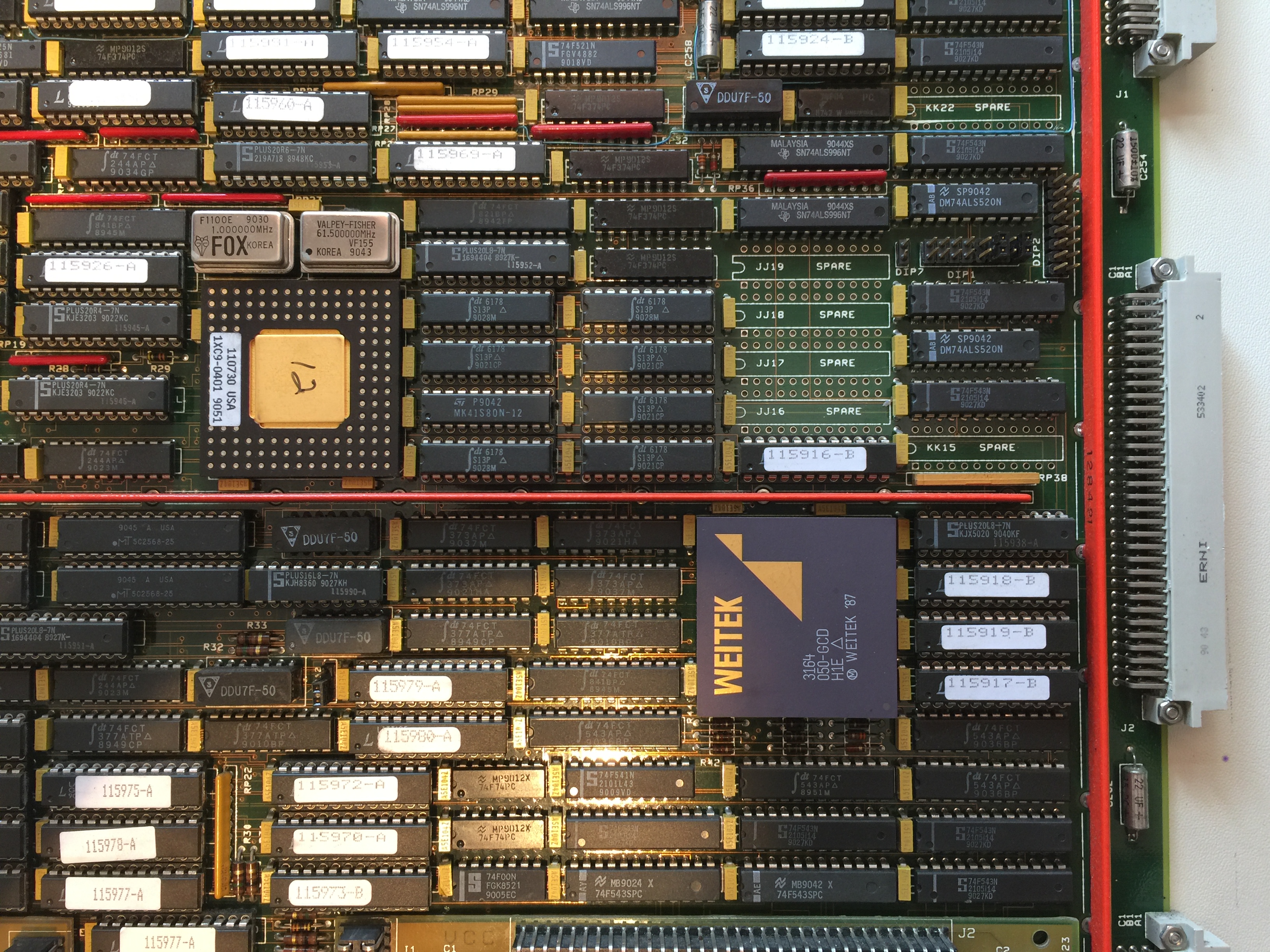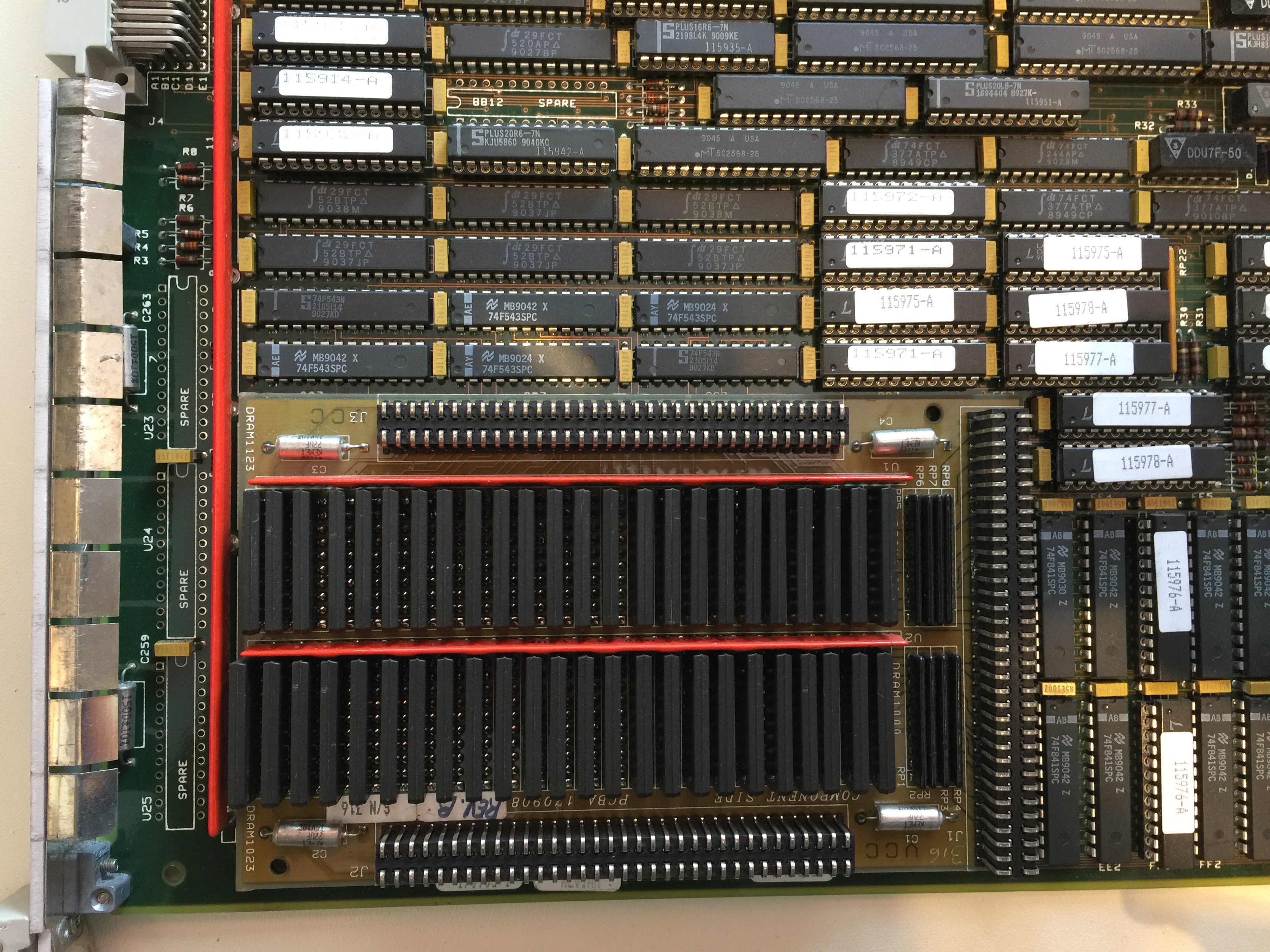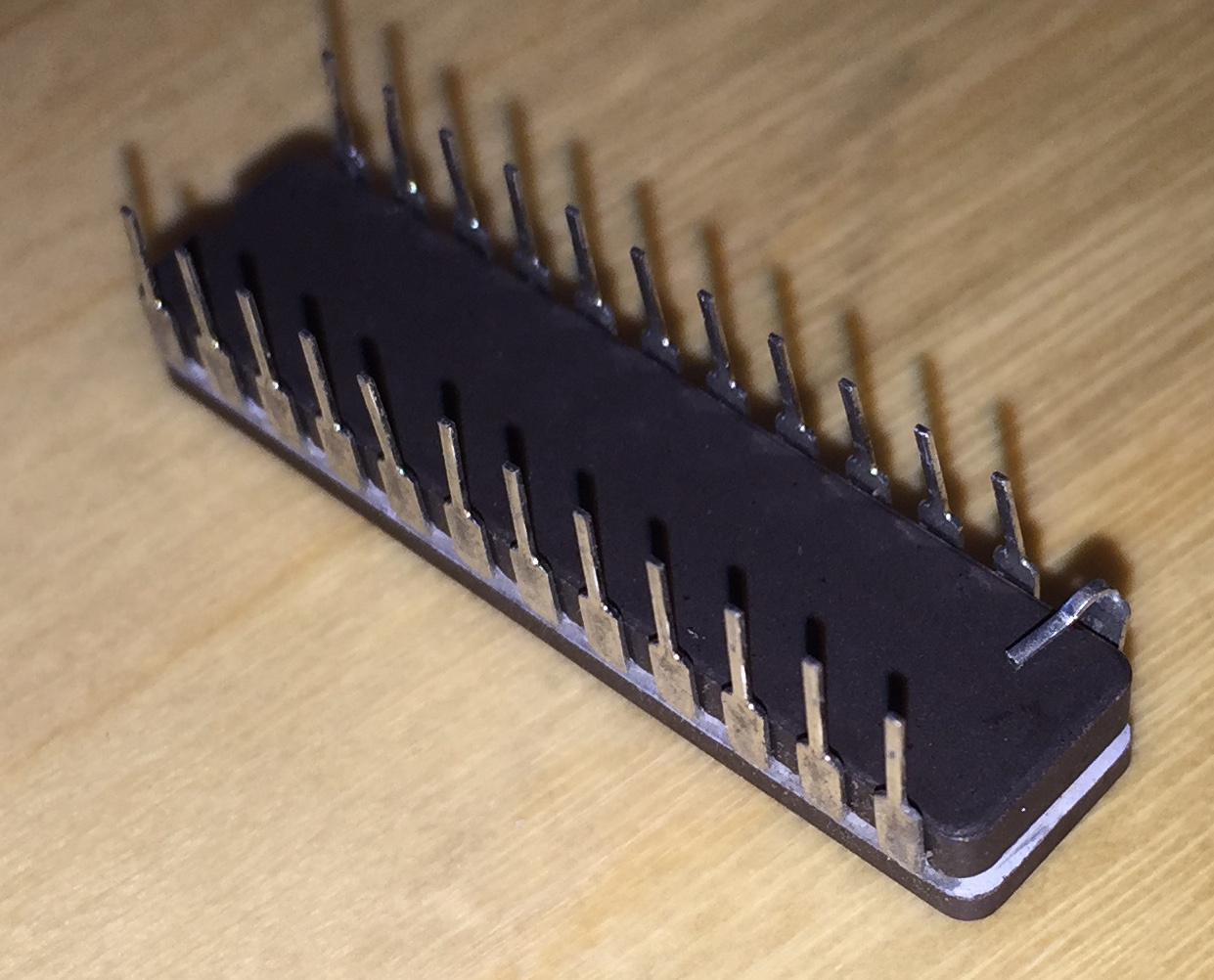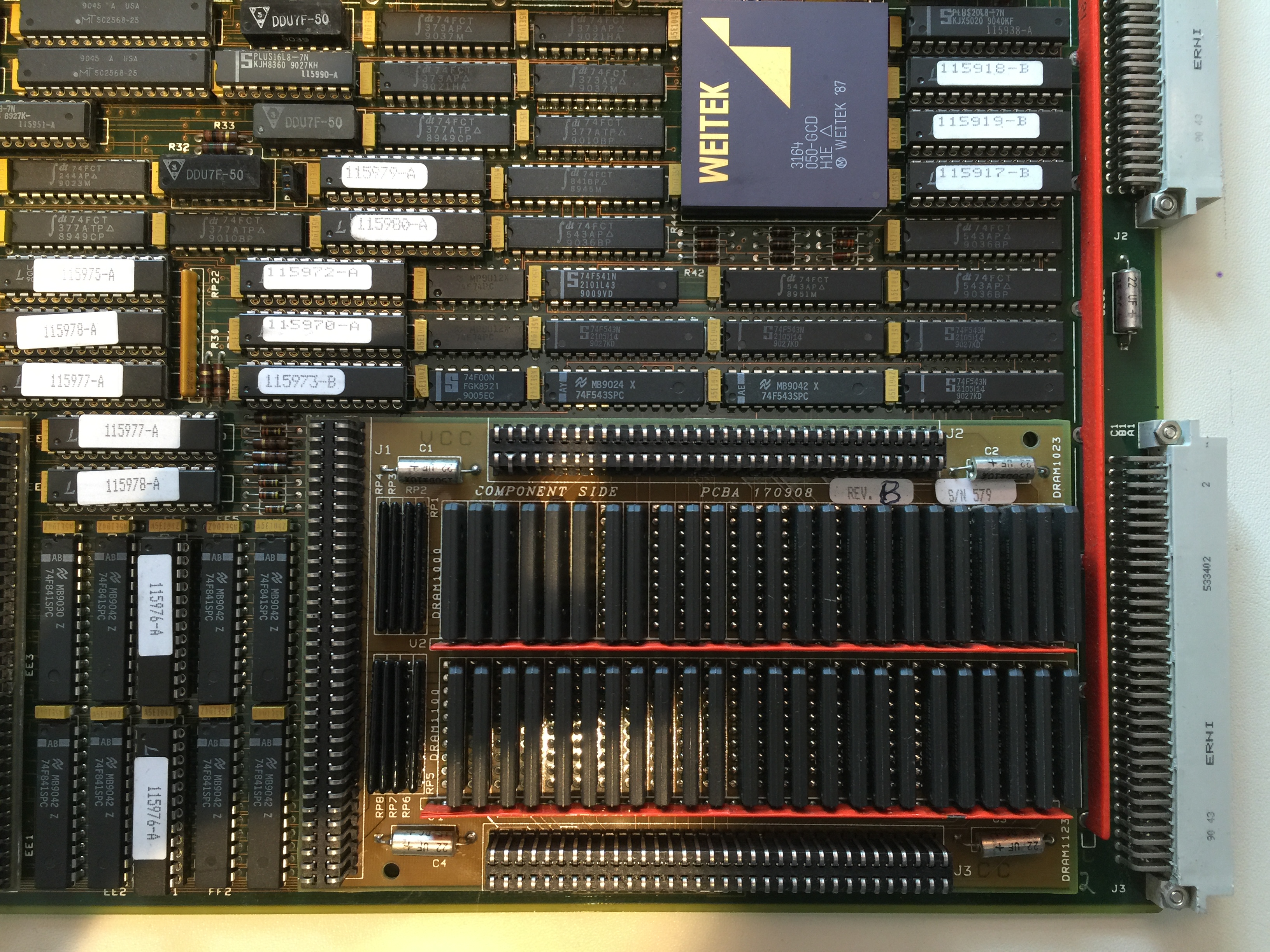UPDATE: I clipped and removed the broken capacitor. Replacing it will be the task of another day.
I spent two days removing, cleaning and reseating each DIP chip on the Symbolics XL1201 Merlin II Main (CPU) board. Earlier I closely examined the solder side of the board and found a few minor discrepancies. This time I also encountered three discrepancies:
- Bent pin on chip BB27 - unbent
- Broken bypass cap next to chip GG7 - I clipped this one off entirely and will replace another day
- One long bodge wire running along the entire top has come loose. This could get snagged on something and fall off.
Additionally, I removed and resocketed the Weitek Floating Point co-processor without doing any cleaning. It looked sparkling clean.
While I was at it, I removed the metal gunk in the spare hole of BB12.
Finally, I examined the component-side of the bad-looking solder joint between CC25-26/DD25-26. It seems this was likely caused by the soldering of a bodge wire to this connection, on a resistor pack/network.
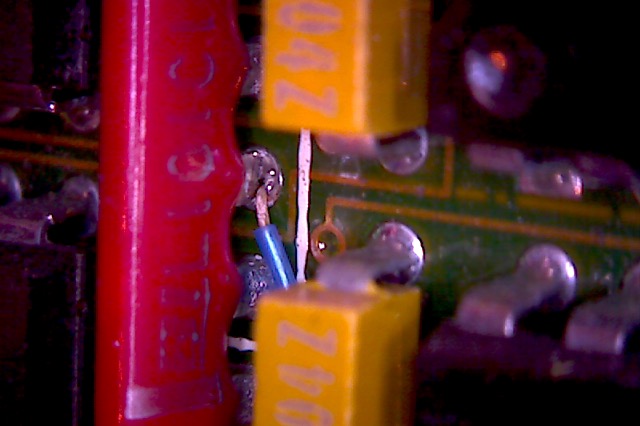
Note that I did not remove the two other PGA chips on the board. One of them is almost certainly the Ivory. They are:
VTC VIC068PGF4 9050 985 VIC ES: Probably the VMEBus controller chip.110730 USA 1XC9-0401 9051: Probably the Ivory CPU, right in the center of the board.
Discrepancies Detailed
I found a broken capacitor between chip FF7 and GG7. Top label says "A5E104Z". Octopart shows a few places to get it, two of which seem to think it's a 0.1 uF 50V cap. One says "A5E104Z ARCO .1MFD-50VDC" and the other says "CAP CER DIP .1UF 50V 80-20% 7.5LS BULK". It's about 6.25mm wide, 2.5mm tall and the top is about 4mm off the circuit board. GG7 is a 74F00N which is a Quad 2-input NAND chip. It likely is a bypass capacitor for this chip, as almost every single chip has one immediately to its left.
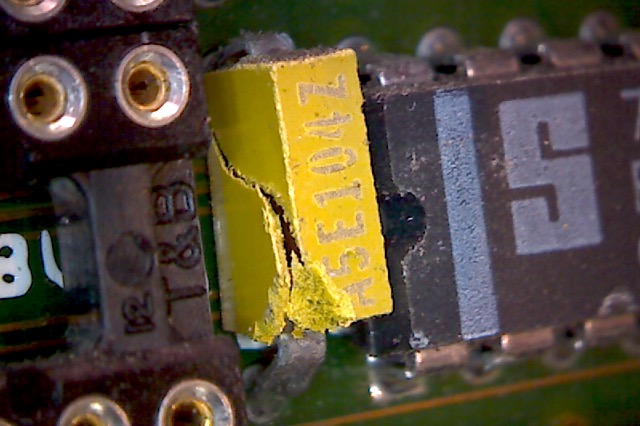
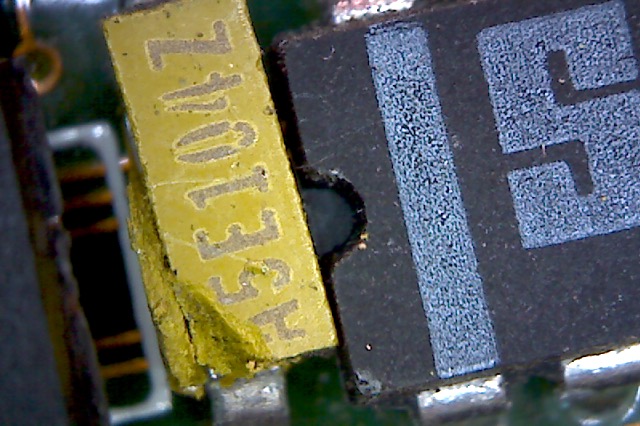
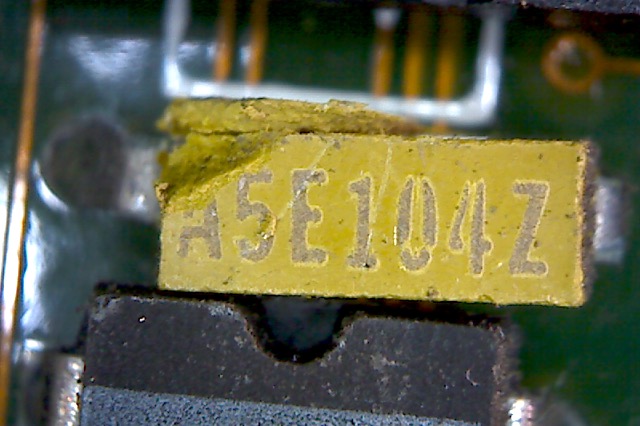
After moving the capacitor around, it was clearly broken all the way across.
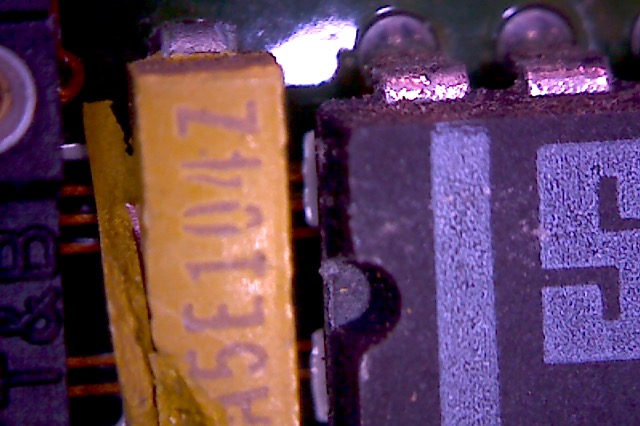
Additionally, I found one bent pin on chip BB27, which also is the only chip with an unusual label, "985-DS/N 582." I believe that this is the chip that contains the serial number, as the board has a sticker saying "S/N 582" as well as "582" hand-scratched into the board. The corresponding socket hole was also slightly marred. I very carefully unbent it and reinstalled it.
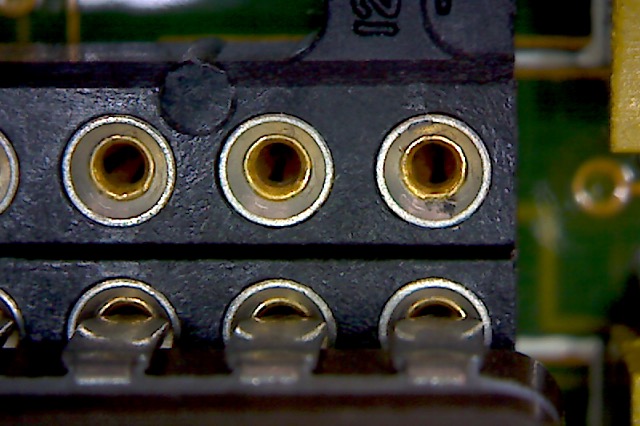
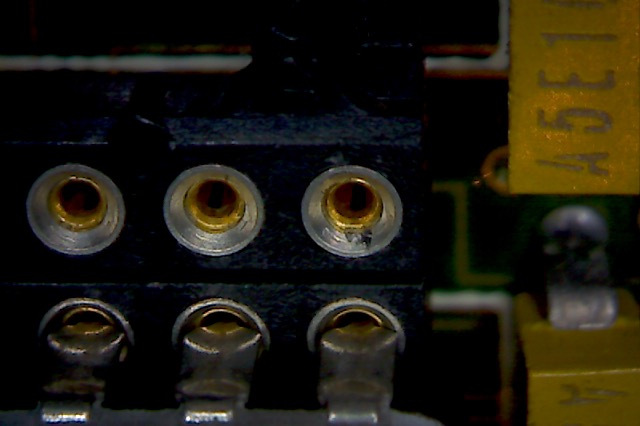
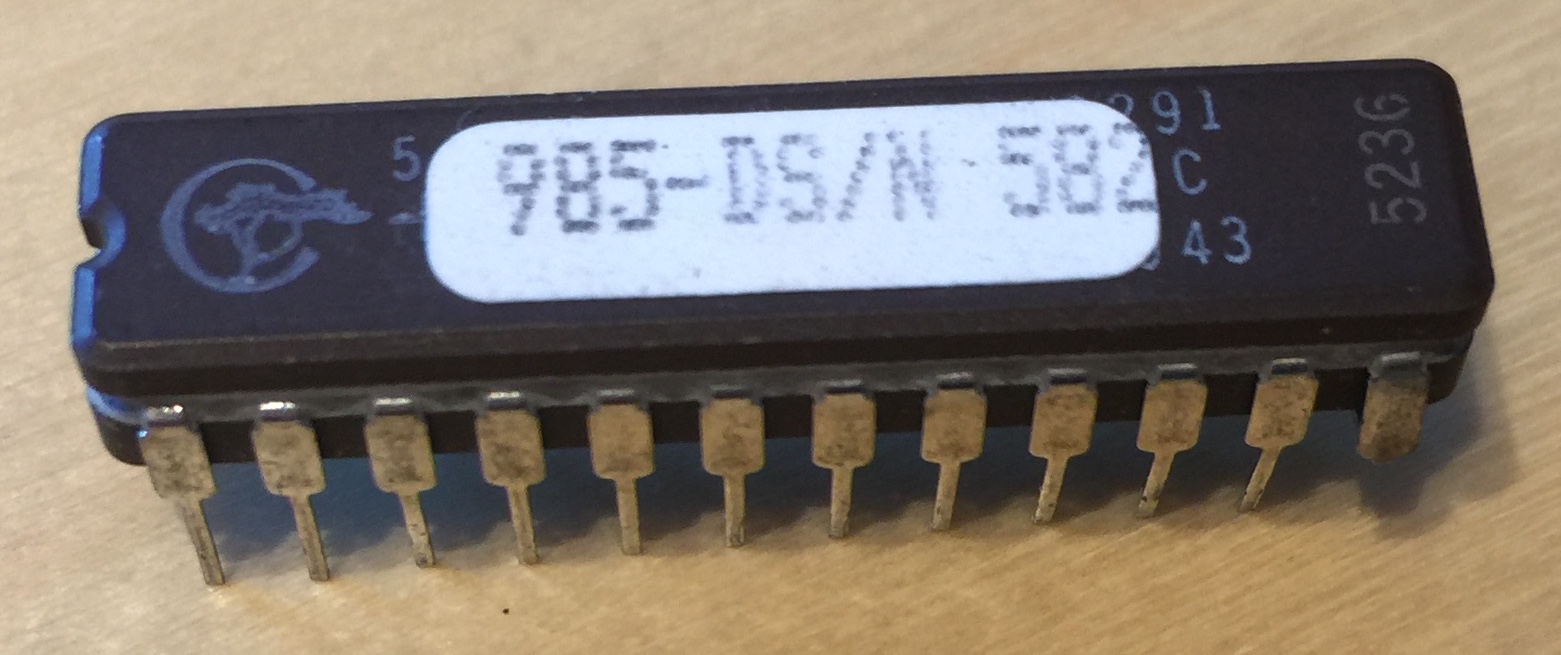
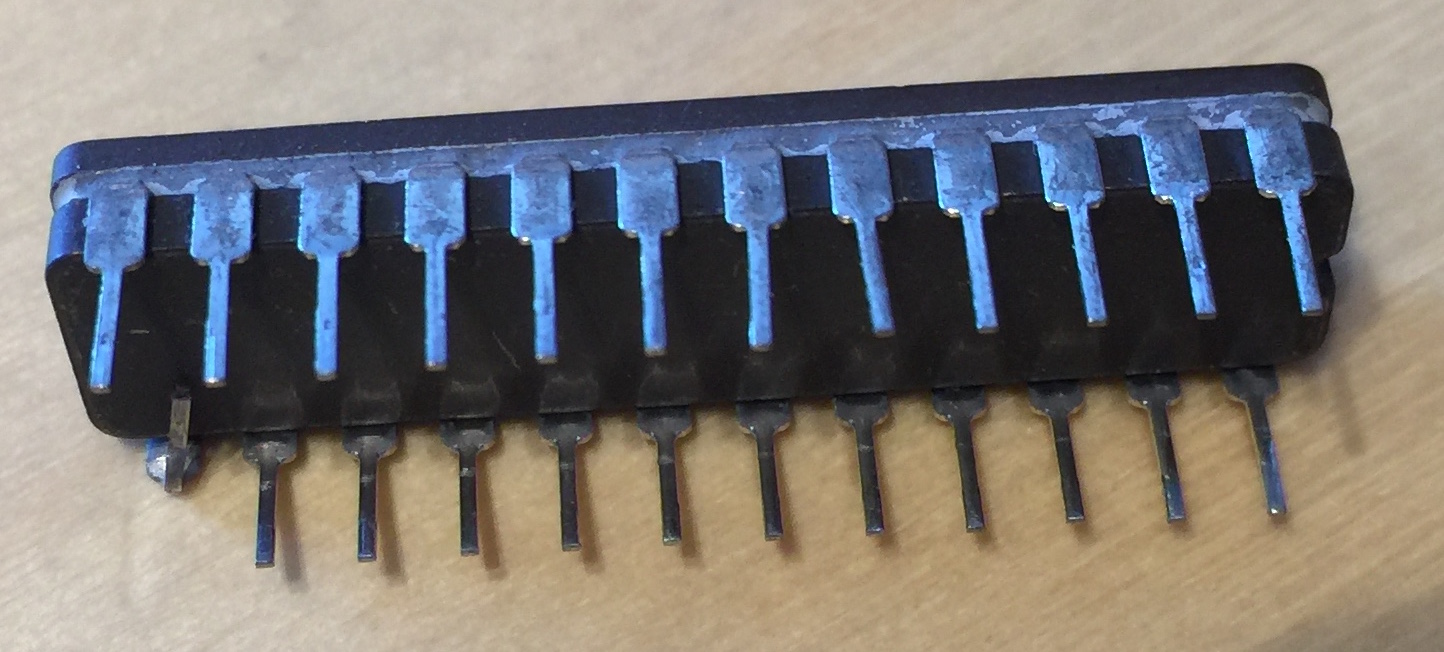
After-repair:
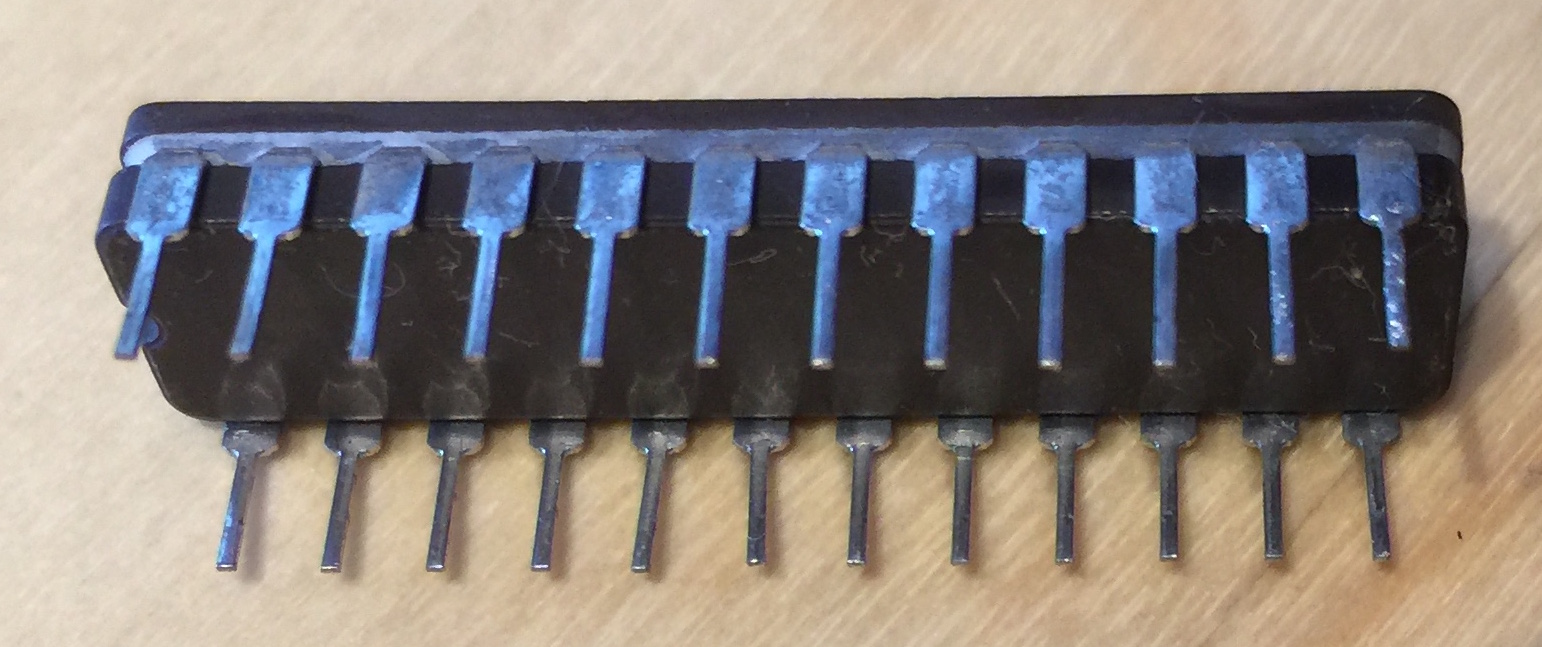
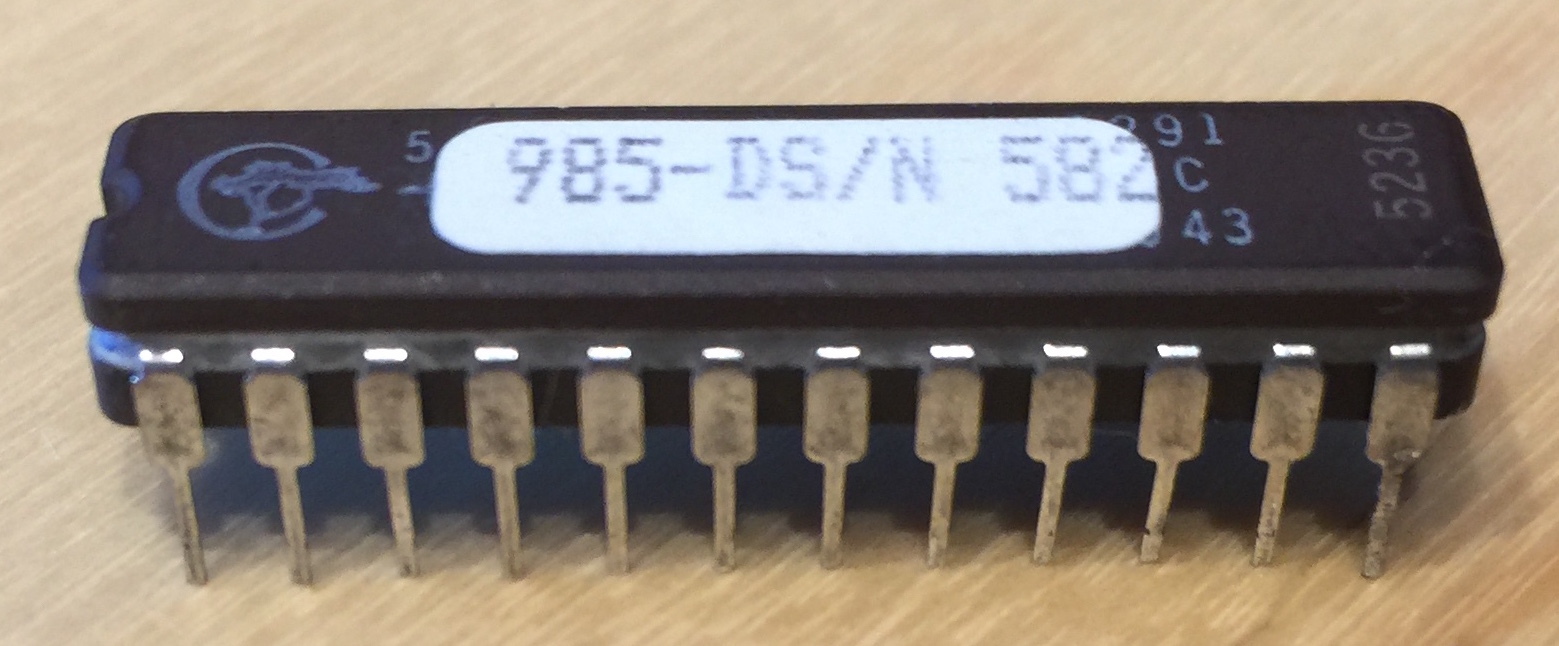
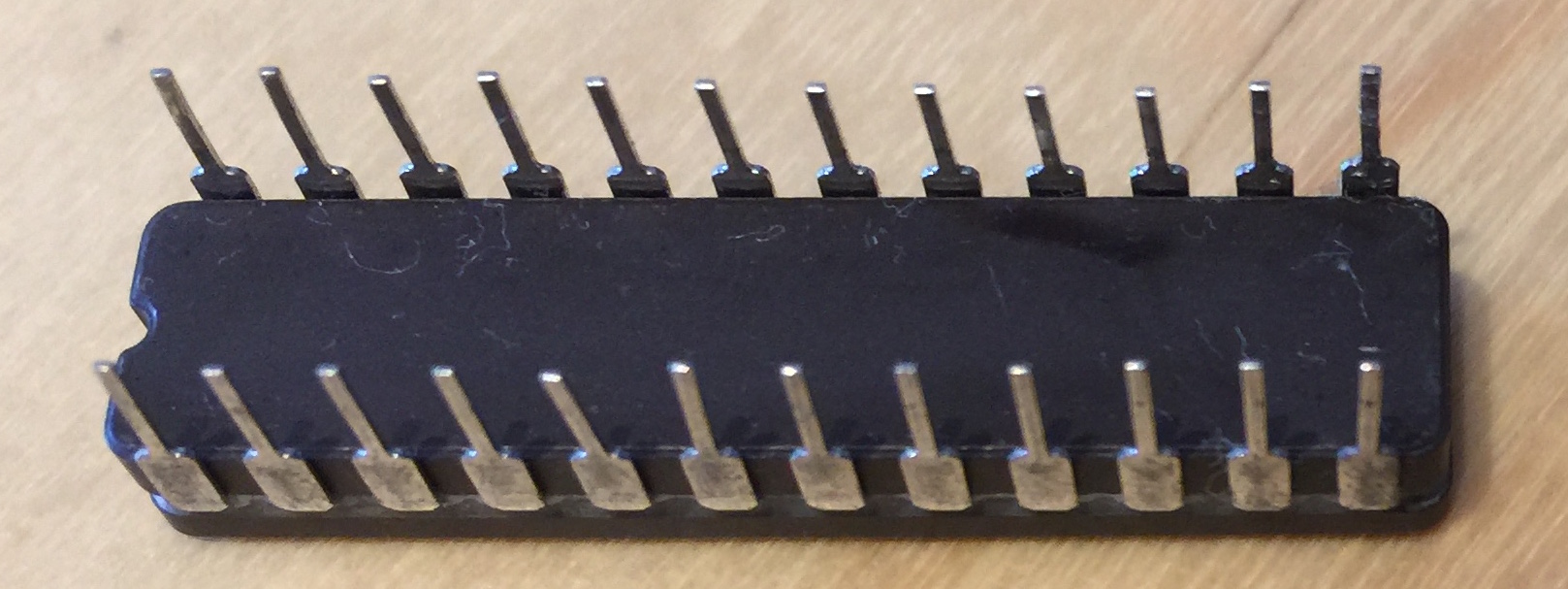
Finally, there are two places with no chip installed into a socket. One iS JJ30 silkscreened "WRPOST" and the other is KK30, silkscreened "AUX-TIMER". There are numerous jumper posts nearby which may enable these, though for what purpose I don't know. There are a total of about eight jumper blocks scattered around the board.
Procedure
- Photograph board with sufficient detail to ensure all chips can be replaced correctly
- Remove each DIP chip, using Wiha Chip Lifter
- Write down the chip location, the silkscreen written under the chip, and the label on the chip (if any)
- Spray some Deoxit D5 onto a Q-tip and wipe the chip's pins clean and set aside to dry
- Spray some contact cleaner into the chip socket, and agitate a bit with a toothbrush
- Air-can dry the socket and, if necessary, the chip
- Reinsert chip
- Verify chip reinserted properly
- Correct location
- Correct orientation
- All pins in their holes correctly
I replaced the Q-tip every 3-6 chips as it would become gray after a short time.
Chips Reseated
- Position: Silkscreen: Chip Label
- AA11: BC-BNK-BUS: 115932-A
- AA12: BC-RFL-ADD: 115914-A
- AA13: BC-OPER-GEN: 115915-A
- AA16: BC-LCLK-G_N: 115958-A
- AA18: (forgot to write down)
- AA22: ID IMBU CT(R?)L: 115921-A
- AA27: ID-DE-GATING: 115962-A
- AA28: ID-STR-CTRL: 115963-A
- BB11: BC-ADDR-PIPE: 115942-A (engraved)
- BB17: BC-QUE-0: 115931-A
- BB18: BC-QUE-1: 115930-A
- BB19: BC-QUE-2: 115929-A
- BB20: BC-QUE-CONT: 115928-A
- BB21: BC-QUE-RFL: 115927-A
- BB22: ID-INTERRUPT: 115920-A
- BB24: CY7C291: 115982-D
- BB24-28 are a different type of chip than all the rest, in a different package. Looks sort of like a KitKat, and harder to get back into the socket. See pictures.
- BB25: CY7C291: 115983-D
- BB26: (forgot to write down)
- BB27: CY7C291: 985-DS/N 582
- This chip had its bottom right-most pin bent in and hence was probably not making solid contact.
- I unbent the pin and reinserted into the socket. See pictures.
- BB28: CY7C291: 115986-D
- BB30: ID-RESET: 115956-A
- CC11: TC 5328 (no label)
- CC12: TC 55328 (no label)
- CC13: BD-RD-PIPE: 115935-A (engraved)
- CC14: BC-DATA-SCH: 115941-A (engraved)
- CC15: BC-WR-PIPE: 115957-A
- CC16: BC-DATA-MON: 115937-A (engraved)
- CC31: ID-ALATCH: 115964-A
- DD7: MEM-WR-CTL: 115971-A
- DD8: BANK-STATE: 115975-A
- DD9: MEM-WR-CTL: 115971-A
- DD10: MEM-RD-CTL: 115972-A
- DD12: CACHE-STBS: 115951-A
- DD13: TC55328 (no label)
- DD14: TC55328 (no label)
- DD16: BC-REQ-DEC: 115965-A (engraved)
- DD18: BC-ADDR-CONT: 115944-A (engraved)
- DD19: BC-QUE01-RDY: 115949-A (engraved)
- DD20: BC-RD-ACK: 115961-C (engraved)
- DD21: BC-2-RFL-RDY: 115948-A (engraved)
- DD22: BC-ACK-GEN: 115947-A (engraved)
- DD29: IM-DRIVE: 115955-B
- Three separate bodge wires go to various pins of this chip's socket.
- EE16: CACHE-REFILL: 115946-A (engraved)
- EE18: CACHE-CNTRL: 115945-A (engraved)
- EE19: CACHE-REQ: 115926-A
- EE22: MII-TIMEOUT: 115968-A
- EE24: SHUFFLE: 115939-B
- EE25: SHUFFLE: 115987-A
- EE26: SHUFFLE: 115987-A
- EE27: SHUFFLE: 115939-B
- EE28: REQ-DECODE: 115966-A
- EE29: V-REQ-ACK: 115992-A
- FF1: MEM-STB: 115976-A (vertical)
- FF4: MEM-STB: 115976-A (vertical)
- FF7: MEM-ACK-BUF: 115973-B
- FF8: MEM-REQ-CNT: 115970-A
- FF9: MEM-RD-CTL: 115972-A
- GG10: MEM-REQ-STATE: 115980-A
- GG11: MEM-REQ-CTL: 115979-A
- FF13: FPA-CLOCK: 115950-A (engraved)
- FF22: IB-REQ-ACKED: 115953-A (engraved)
- FF23: IB-CNTRL: 115960-A
- FF24: POLLED-CNTRL: 115991-A
- FF25: PLD-DECODE: 115943-A
- FF27: V-ARBITOR: 115933-D (very faint)
- FF28: ILB-CNTRL: 115934-C
- FF29: SHUFFLE: 115987-A
- FF30: SHUFFLE: 115939-B
- GG15: IDT6178S: (no label)
- GG16: IDT6178S: (no label)
- GG17: IDT6178S: (no label)
- GG18: IDT6178S: (no label)
- GG19: IB-DECODE: 115952-A (engraved)
- GG21: MII-REFRESH: 115969-A
- GG23: REQ-DECODE: 115954-A
- GG31: SHUFFLE: 115939-B
- HH15: DT6178S: (no label)
- HH16: DT6178S: (no label)
- HH17: DT6178S: (no label)
- HH18: DT6178S: (no label)
- HH25: MEM-LTRL: 115950-A (engraved)
- HH31: SHUFFLE: 115987-A
- JJ15: MII-FP0-WR: 115916-B
- JJ23: TRIGGER: 115924-B
- JJ24: PARITY: 115925-A
- JJ25: QUINT-MUX: 115981-A
- JJ26: QUINT-MUX: 115981-A
- JJ28: VME-DECODE: 115923-D
- JJ30: WRPOST (no chip installed)
- KK11: MII-FP0-RD: 115917-B
- KK12: MII-TAG-CNTR: 115919-B
- KK13: MII-FP1: 115918-B
- KK14: MII-FPA-MISC: 115938-A (engraved)
- KK31: AUX-TIMER (no chip installed)
- Weitek FPA: Removed, inspected & reinserted only (not cleaned)
Additional Pictures
